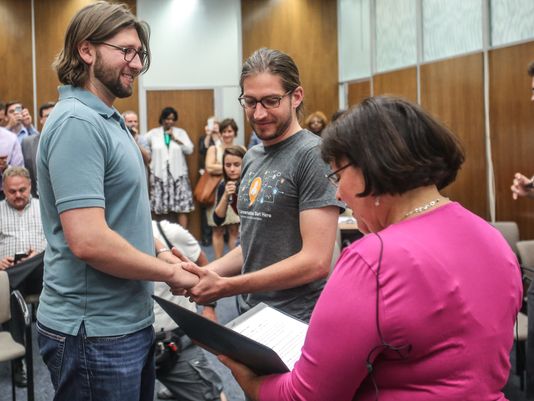The body of Ashley Sherman was discovered on the east side of Indianapolis on Sunday evening by a police officer who was making a traffic stop in the area. Ashley was a black trans woman who identified as female according to family members, and called herself Ashley according to co-workers. She had been the victim of numerous cases of harassment and abuse, and was a runaway at age 12. Police later updated their reports with the information that Ashley had been shot in the head. Neighbors in the Tudor Park Condominiums report hearing a shot around midnight that evening.
Initial coverage of Ashley Sherman’s death was complicated by the police and local media misgendering her as male after initially identifying her as female, and mis-naming her as her dead name instead of her chosen name. Misreporting trans women’s murders by mis-gendering has been linked to problems with tracking murders of trans women nationwide and hampered police investigations of those murders. Mis-naming murder victims contributes to lack of police evidence as they attempt to speak to friends who might have known the victim by their chosen name but not their birth name.
GLAAD’s guidelines on trans people call for media to correctly identify and name trans people in news stories by their chosen names and gender markers.
GLAAD Media Reference Guide –Transgender Issues
GLAAD Media Reference Guide – In Focus: Covering the Transgender Community
Fox 59’s coverage currently mis-genders Ashley and mis-names her – Homicide investigation underway after officer finds body near road on east side (originally: Woman’s Body Found Near Road on City’s East Side)
INDIANAPOLIS, Ind. (October 27, 2014) – A man’s body was found near the road on the city’s east side early Monday morning.
An Indianapolis Metropolitan police officer was driving near the Tudor Park Condominiums near the intersection of East 38th Street and North Mitthoeffer Road around midnight when he looked out his car window and saw the deceased person. The officer had just finished a traffic stop nearby.
Officers collected evidence from the scene and removed the body. Detectives say the man, identified as 25-year-old Tajshon Sherman, had been shot in the head.
Sherman was listed as a runaway at the age of 12 and has been mentioned in dozens of Marion County police reports since then. Several of those cases list Sherman as the victim of harassment or abuse. Others list Sherman as the suspect in prostitution and commercial sex arrests.
The exact cause of death will be determined following an autopsy. However, police said they are investigating this as a homicide.
If you know anything, call Crime Stoppers at 317-262-TIPS.
Initially Fox gave Ashley correct pronouns in the video report, but “corrected” their written story after police identified Ashley and “updated” their report. Evidence of the initial story remains in the link to the news item: http://fox59.com/2014/10/27/womans-body-found-near-road-on-citys-east-side/. In addition, the sensationalism of noting Ashley’s arrests for sex work contributes to discrimination against her, as evidenced by the comments on some of the news reports about her.
The IndyStar similarly reported and then misreported Ashley’s discovery, as can be seen in their news story – Body found on Far Eastside ruled homicide
Police have identified the person whose body was found late Sunday night on the Far Eastside as 25-year-old Tajshon Sherman of Indianapolis.
Sherman’s body was found in the 3600 block of Tudor Park Drive about 11:40 p.m. Sunday, said a dispatcher with the Indianapolis Metropolitan Police Department.
That is the area of Tudor Park Condominiums, which are east of Post Road and south of 38th Street.
Police have ruled the death a homicide.
The body was found outdoors in a grassy area along a road by an IMPD officer who spotted it as he drove past the area after making a traffic stop, IMPD Sgt. Kendale Adams said. Police originally identified the body as a woman’s but later said it was a man’s.
The body appeared to have sustained severe head injuries, Adams said. Police are unsure where or how the man was killed.
Anyone with information that could prove helpful to investigators may call Crime Stoppers at (317) 262-TIPS (8477).
WISH-TV’s coverage is mixed on identifying Ashley as she identified. They mention that she identified as female but neglect to mention Ashley’s chosen name and use her birth name instead – Mother calling for justice in Tajshon’s murder
INDIANAPOLIS (WISH) – An Indianapolis mother calls for justice after learning her child was found shot to death near the side of a road.
Deshea Sherman is pleading for whoever is responsible to come forward. Late Monday afternoon the Marion County corner identified the victim 25-year old Tajshon Sherman.
“That was my son. He had a life like everybody else did. He didn’t deserve to have to die like this,” Sherman said.
You could hear the pain and heartache in Sherman’s voice. She’s grieving about the tragic death of her son Tajshon. Police found the 25 year-old’s body lying under a light pole outside Tudor Park Condominiums. Investigators said Tajshon was shot to death.
“He didn’t deserve to die like that; no body deserves to be shot and killed,” said a family friend.
Family and friends gathered at the crime scene to console one another. They said Tajshon lived as a woman. The lead detective on the case was also on the scene looking for more clues into Tajshon’s death. He said right now they are not investigating Tajshon’s death as a hate crime.
“Everybody knew what he was and what he was about. That was still my child,” said Sherman.
“Shon was like a brother to me; he called me brother. He stayed at my house,” said family friend Kenneth Hearn.
Marleeta Wilcox lives in the east side neighborhood. She didn’t know Tajshon, but brought this small brown teddy bear to the scene.
“It’s just sad that (it) took someone’s child, somebody’s relative. Somebody loved that person and now they are gone,” Wilcox said.
“Not only did you hurt our family, but you hurt your own family for the crime that you have done,” said a family friend.
“You was wrong for what you did, you could have just let him go,” said Sherman.
Sherman said she will always be proud of Tajshon.
“Still proud to be his mother to this day and I love him no matter what and I just want justice done for him,” she said.
Police are not sure if Tajshon was killed where the body was found or if the body was dumped there.
It was after midnight when an officer on patrol doing a traffic stop found the body.
Anyone with information that could help police should call Crime Stoppers at 262-TIPS.
Tuesday at 5 p.m., the family will hold a candlelight vigil in the same spot where Tajshon’s body was found.
WRTV-6 has done better about telling Ashley’s story, although identifying her as trans might help police investigate her murder and they aren’t using her chosen name – Woman’s body found in east-side yard
INDIANAPOLIS – Indianapolis police are investigating the death of a 25-year-old woman whose body was found Sunday night.
The Indianapolis Metropolitan Police Department said the woman’s body was found in the yard at 3752 Tudor Park Drive, which is near the intersection of 38th Street and Mitthoeffer Road on the city’s east side.
The body was later identified as Tajshon Sherman, 25, of Indianapolis. Her death has been ruled a homicide.
Police spotted the body during a routine patrol of the area.
In 2003, 17-year-old Nireah Johnson, a black trans woman was murdered after a man she was interested in found out she was trans. Nireah was killed along with her friend Brandie Coleman. News coverage of the two young women’s deaths was complicated and sensationalized by the mis-gendering and mis-naming of Nireah, which continued long after her death. She is currently buried at Crown Hill Cemetery under her birth name, Gregory Johnson.





